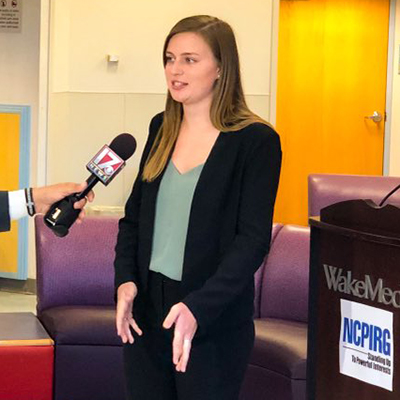
Katie Craig
State Director, NCPIRG Education Fund
Last year, in 2021, the North Carolina General Assembly passed House Bill 951, which sets carbon reduction targets for the state, including 70% reduction by 2030 and carbon neutrality by 2050. Now, the North Carolina Utilities Commission is considering a proposed plan which sets us up to fail to meet those targets from the very start. So we testified against it, here’s what we said.
State Director, NCPIRG Education Fund
Hello commission and thank you for having us here tonight. My name is Katie Craig and I am the state director of the North Carolina Public Interest Research Group, NCPIRG. We are a non-partisan, non-profit organization that advocates for the public interest and has been working to protect consumers and public health for over 50 years.
As a native North Carolinian, I have grown up seeing the effects that climate change has already begun to have on our state, its residents, and the places we love. From sea level rise, to increasing frequent and increasingly stronger hurricanes, to hotter summers every year, the effects of global warming are here now.
Our reliance on dirty fossil fuels not only exacerbates this trend, but also harms air quality and public health, and is a bad deal for our consumers.
Last year, by passing HB951, folks from both sides of the aisle came together to acknowledge the reality that we need to move to a clean energy future and set ambitious targets to help us do that.
But now, 3 of the 4 proposed plans that sit in front of us today, fail to meet those targets from the start. And all of the plans continue our reliance on dirty energy sources that harm our planet, health, and wallets.
We must not accept a plan that sets out to miss the targets from the start. The North Carolina Utilities Commission should ensure the carbon plan hits the target deadline of 70% reduction by 2030 and can do that by prioritizing these 5 things:
Ultimately it is within the power of this body to decide how we best move towards a clean energy future. A healthier, safer future is possible, but only if we move fast. That is why it is essential the commission only consider adopting plans that meet the 2030 target and consider these proposed actions to ensure we do so.
Photo Credit: “Renewable Energy Concept”, Public Domain, by Seagul on Pixabay
State Director, NCPIRG Education Fund
Katie directs NCPIRG's statewide campaign strategy, organizational development, research, communication and legislative advocacy efforts. Katie was born and raised in Raleigh, North Carolina, and continues to live there now. When she’s not working, Katie enjoys traveling and spending time with friends and family.